

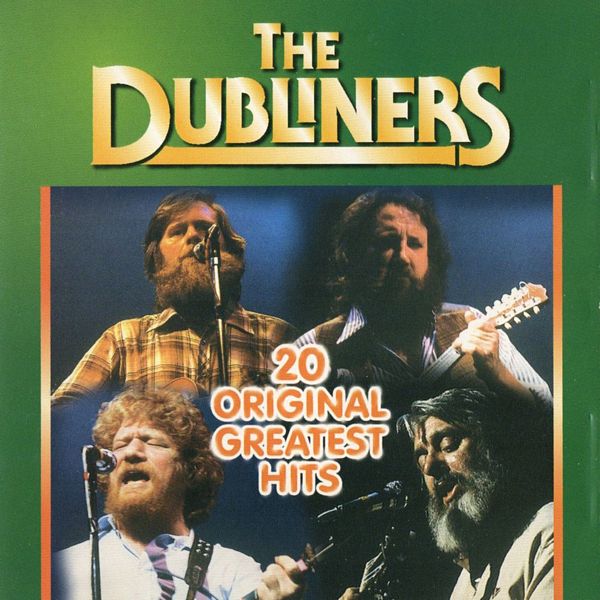 |
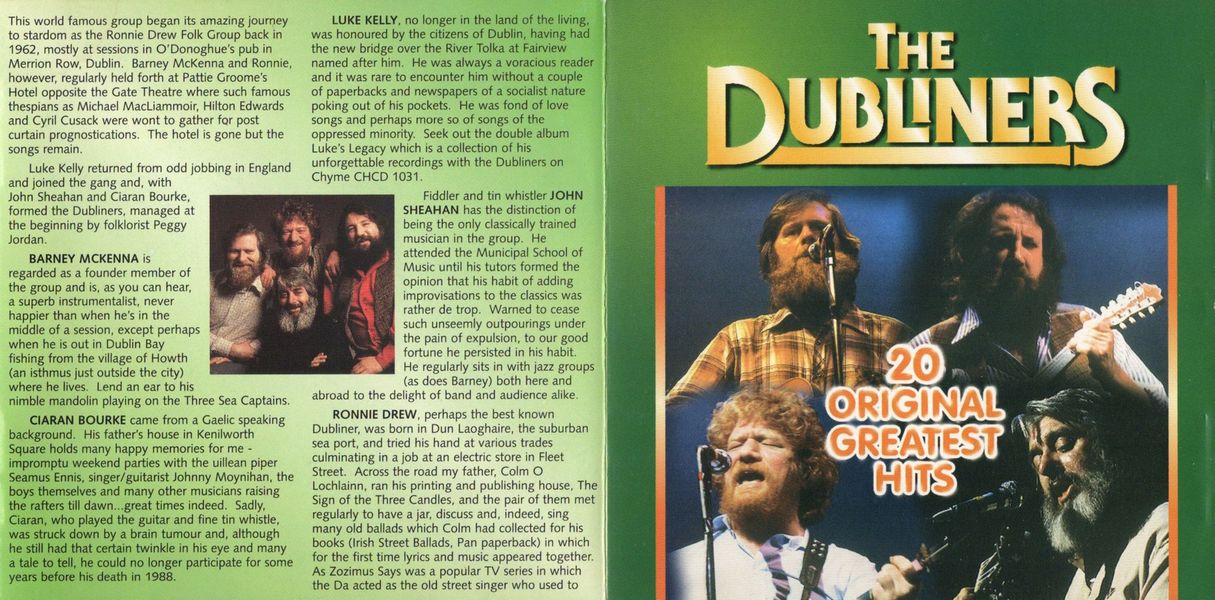
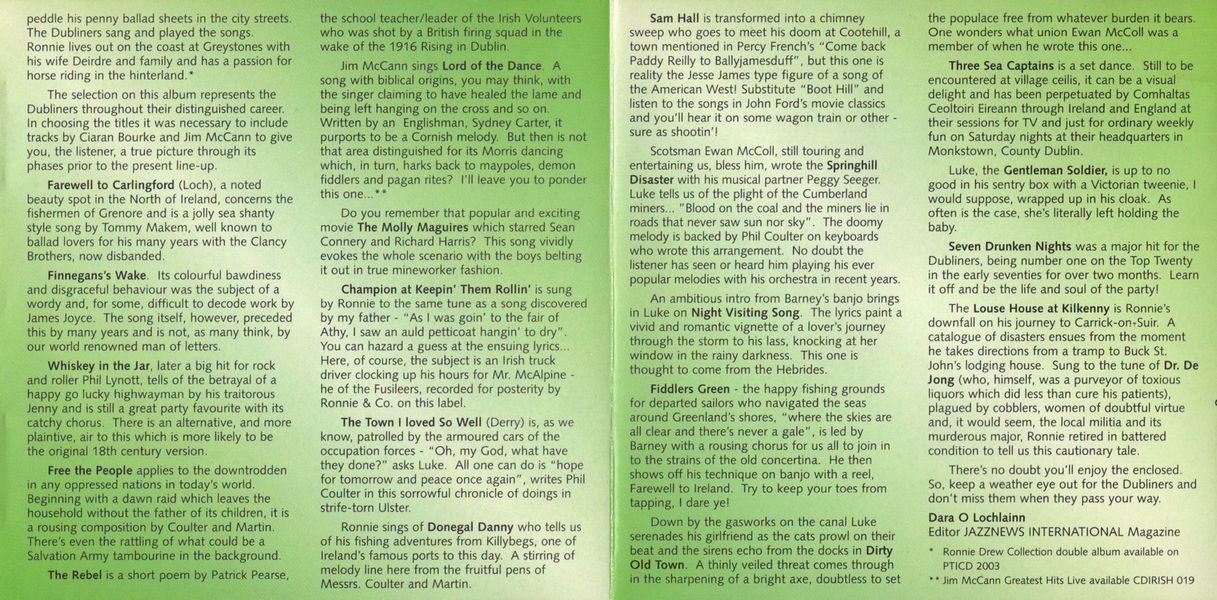
|
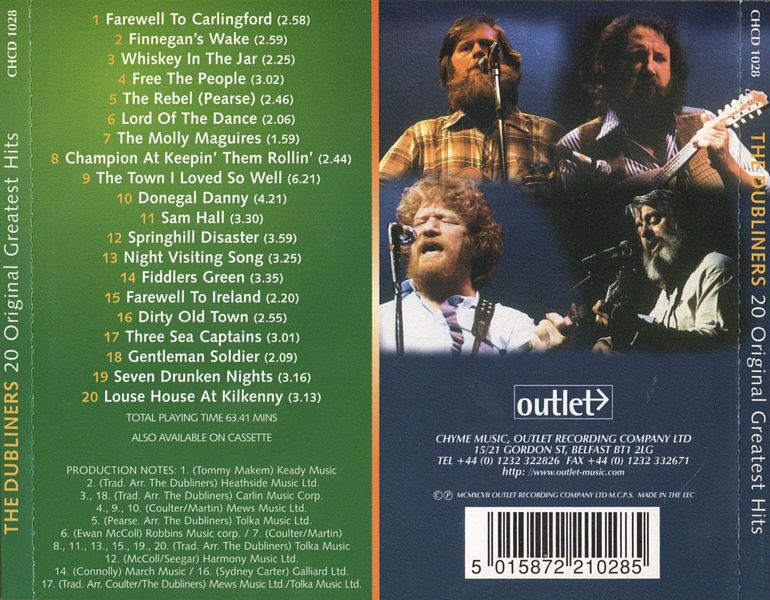
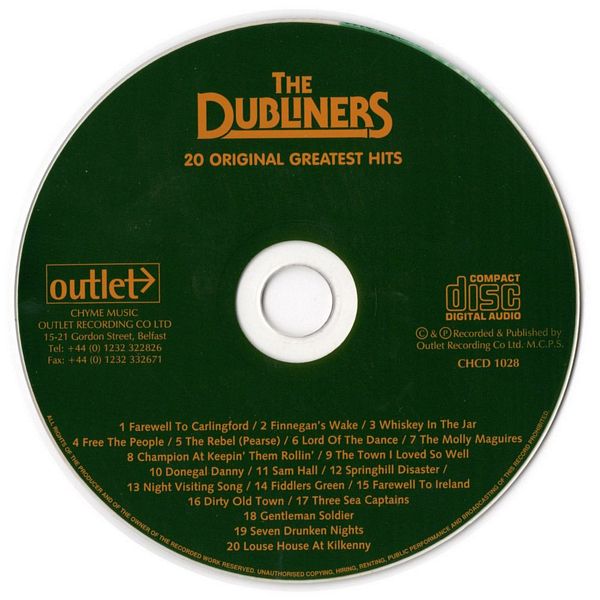
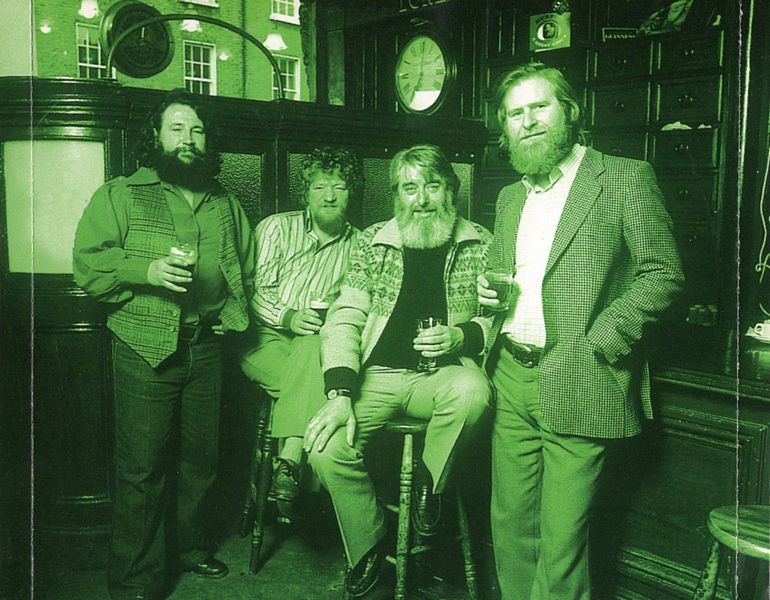
|
Sleeve Notes
This world famous group began its amazing journey to stardom as the Ronnie Drew Folk Group back in 1962, mostly at sessions in O'Donoghue's pub in Merrion Row, Dublin. Barney McKenna and Ronnie, however, regularly held forth at Pattie Groome's Hotel opposite the Gate Theatre where such famous thespians as Michael MacLiammoir, Hilton Edwards and Cyril Cusack were wont to gather for post curtain prognostications. The hotel is gone but the songs remain.
Luke Kelly returned from odd jobbing in England and joined the gang and, with John Sheahan and Ciaran Bourke, formed the Dubliners, managed at the beginning by folklorist Peggy Jordan.
BARNEY MCKENNA is regarded as a founder member of the group and is, as you can hear, a superb instrumentalist, never happier than when he's in the middle of a session, except perhaps when he is out in Dublin Bay fishing from the village of Howth (an isthmus just outside the city) where he lives. Lend an ear to his nimble mandolin playing on the Three Sea Captains.
CIARAN BOURKE came from a Gaelic speaking background. His father's house in Kenilworth Square holds many happy memories for me — impromptu weekend parties with the uillean piper Seamus Ennis, singer/guitarist Johnny Moynihan, the boys themselves and many other musicians raising the rafters till dawn … great times indeed. Sadly, Ciaran, who played the guitar and fine tin whistle, was struck down by a brain tumour and, although he still had that certain twinkle in his eye and many a tale to tell, he could no longer participate for some years before his death in 1988.
LUKE KELLY, no longer in the land of the living, was honoured by the citizens of Dublin, having had the new bridge over the River Tolka at Fairview named after him. He was always a voracious reader and it was rare to encounter him without a couple of paperbacks and newspapers of a socialist nature poking out of his pockets. He was fond of love songs and perhaps more so of songs of the oppressed minority. Seek out the double album Luke's Legacy which is a collection of his unforgettable recordings with the Dubliners on Chyme CHCD 1031.
Fiddler and tin whistler JOHN SHEAHAN has the distinction of being the only classically trained musician in the group. He attended the Municipal School of Music until his tutors formed the opinion that his habit of adding improvisations to the classics was rather de trop. Warned to cease such unseemly outpourings under the pain of expulsion, to our good fortune he persisted in his habit. He regularly sits in with jazz groups (as does Barney) both here and abroad to the delight of band and audience alike.
RONNIE DREW, perhaps the best known Dubliner, was born in Dun Laoghaire, the suburban sea port, and tried his hand at various trades culminating in a job at an electric store in Fleet Street. Across the road my father, Colm O Lochlainn, ran his printing and publishing house, The Sign of the Three Candles, and the pair of them met regularly to have a jar, discuss and, indeed, sing many old ballads which Colm had collected for his books (Irish Street Ballads, Pan paperback) in which for the first time lyrics and music appeared together. As Zozimus Says was a popular TV series in which the Da acted as the old street singer who used to peddle his penny ballad sheets in the city streets. The Dubliners sang and played the songs, Ronnie lives out on the coast at Greystones with his wife Deirdre and family and has a passion for horse riding in the hinterland.
The selection on this album represents the Dubliners throughout their distinguished career. In choosing the titles it was necessary to include tracks by Ciaran Bourke and Jim McCann to give you, the listener, a true picture through its phases prior to the present line-up.
Farewell to Carlingford (Loch), a noted beauty spot in the North of Ireland, concerns the fishermen of Grenore and is a jolly sea shanty style song by Tommy Makem, well known to ballad lovers for his many years with the Clancy Brothers, now disbanded.
Finnegans's Wake. Its colourful bawdiness and disgraceful behaviour was the subject of a wordy and, for some, difficult to decode work by James Joyce. The song itself, however, preceded this by many years and is not as many think, by our world renowned man of letters.
Whiskey in the Jar, later a big hit for rock and roller Phil Lynott, tells of the betrayal of a happy go lucky highwayman by his traitorous Jenny and is still a great party favourite with its catchy chorus. There is an alternative, and more plaintive, air to this which is more likely to be the original 18th century version.
Free the People applies to the downtrodden in any oppressed nations in today's world. Beginning with a dawn raid which leaves the household without the father of its children, it is a rousing composition by Coulter and Martin. There's even the rattling of what could be a Salvation Army tambourine in the background.
The Rebel is a short poem by Patrick Pearse, school teacher/leader of the Irish Volunteers who was shot by a British firing squad in the wake of the 1916 Rising in Dublin.
Jim McCann sings Lord of the Dance. A song with biblical origins, you may think, with the singer claiming to have healed the lame and being left hanging on the cross and so on. Written by an Englishman, Sydney Carter, it purports to be a Cornish melody. But then is not that area distinguished for its Morris dancing which, in turn, harks back to maypoles, demon fiddlers and pagan rites? I'll leave you to ponder this one …
Do you remember that popular and exciting movie The Molly Maguires which starred Seán Connery and Richard Harris? This song vividly evokes the whole scenario with the boys belting it out in true mineworker fashion.
Champion at Keepin' Them Rollin' is sung by Ronnie to the same tune as a song discovered by my father — "As I was goin' to the fair of Athy, I saw an auld petticoat hangin' to dry". You can hazard a guess at the ensuing lyrics … Here, of course, the subject is an Irish truck driver clocking up his hours for Mr. McAlpine -he of the Fusileers, recorded for posterity by Ronnie & Co. on this label.
The Town I loved So Well (Derry) is, as we know, patrolled by the armoured cars of the occupation forces — "Oh, my God, what have they done?" asks Luke. All one can do is "hope for tomorrow and peace once again”, writes Phil Coulter in this sorrowful chronicle of doings in strife-torn Ulster.
Ronnie sings of Donegal Danny who tells us of his fishing adventures from Killybegs, one of Ireland's famous ports to this day. A stirring of melody line here from the fruitful pens of Messrs. Coulter and Martin.
Sam Hall is transformed into a chimney sweep who goes to meet his doom at Cootehill, a town mentioned in Percy French's "Come back Paddy Reilly to Ballyjamesduff", but this one is reality the Jesse James type figure of a song of the American West! Substitute "Boot Hill" and listen to the songs in John Ford's movie classics and you'll hear it on some wagon train or other -sure as shootin'!
Scotsman Ewan McColl, still touring and entertaining us, bless him, wrote the Springhill Disaster with his musical partner Peggy Seeger. Luke tells us of the plight of the Cumberland miners … "Blood on the coal and the miners lie in roads that never saw sun nor sky". The doomy melody is backed by Phil Coulter on keyboards who wrote this arrangement. No doubt the listener has seen or heard him playing his ever popular melodies with his orchestra in recent years.
An ambitious intro from Barney's banjo brings in Luke on Night Visiting Song. The lyrics paint a vivid and romantic vignette of a lover's journey through the storm to his lass, knocking at her window in the rainy darkness. This one is thought to come from the Hebrides.
Fiddlers Green — the happy fishing grounds for departed sailors who navigated the seas around Greenland's shores, "where the skies are all clear and there's never a gale", is led by Barney with a rousing chorus for us all to join in to the strains of the old concertina. He then shows off his technique on banjo with a reel, Farewell to Ireland. Try to keep your toes from tapping, I dare ye!
Down by the gasworks on the canal Luke serenades his girlfriend as the cats prowl on their beat and the sirens echo from the clocks in Dirty Old Town. A thinly veiled threat comes through in the sharpening of a bright axe, doubtless to set the populace free from whatever burden it bears. One wonders what union Ewan McColl was a member of when he wrote this one …
Three Sea Captains is a set dance. Still to be encountered at village ceilis, it can be a visual delight and has been perpetuated by Comhaltas Ceoltoiri Eireann through Ireland and England at their sessions for TV and just for ordinary weekly fun on Saturday nights at their headquarters in Monkstown, County Dublin.
Luke, the Gentleman Soldier, is up to no good in his sentry box with a Victorian tweenie, I would suppose, wrapped up in his cloak. As often is the case, she's literally left holding the baby.
Seven Drunken Nights was a major hit for the Dubliners, being number one on the Top Twenty in the early seventies for over two months. Learn it off and be the life and soul of the party!
The Louse House at Kilkenny is Ronnie's downfall on his journey to Carrick-on-Suir. A catalogue of disasters ensues from the moment he takes directions from a tramp to Buck St. John's lodging house. Sung to the tune of Dr. De Jong (who, himself, was a purveyor of toxious liquors which did less than cure his patients), plagued by cobblers, women of doubtful virtue and, it would seem, the local militia and its murderous major, Ronnie retired in battered condition to tell us this cautionary tale.
There's no doubt you'll enjoy the enclosed. So, keep a weather eye out for the Dubliners and don't miss them when they pass your way.
Dara O Lochlainn
Editor JAZZNEWS INTERNATIONAL Magazine